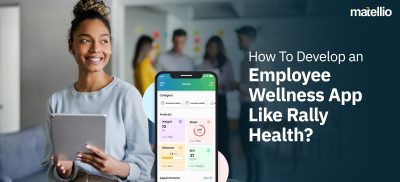
Do you ever feel like coordinating doctor appointments is more challenging than running a marathon? Between navigating busy phone lines, waiting on hold, and playing voicemail tag, the process can be enough to give anyone a headache.
The healthcare industry is rapidly evolving, with technology playing a crucial role in enhancing patient care and streamlining administrative processes. One area where technology has made significant strides is in patient scheduling. Patient scheduling apps have revolutionized how healthcare providers manage appointments, reducing wait times, improving patient satisfaction, and increasing efficiency.
In this blog, we will explore the development process of a patient scheduling app and the key features it offers to healthcare providers and patients alike.
Ready to join the healthcare revolution and explore the transformative potential of patient scheduling apps? So, let’s get started.
Key Features of Patient Scheduling App
Patient scheduling apps revolutionize how healthcare providers manage appointments and streamline patient visits. Here are some key features that make these apps invaluable:
Appointment Booking
Patients can schedule appointments directly through the app, selecting preferred dates and times. Providers can set their availability, and patients can see open slots to book appointments accordingly.
Appointment Reminders
Patient scheduling apps send reminders to patients via SMS, email, or push notifications to reduce no-shows. It allows patients to choose their preferred reminder method and timing.
Patient Management
Custom patient scheduling app maintains detailed patient profiles with contact information, medical history, and appointment history. Providers can add visit notes and update patient records directly within the app.
Telemedicine Integration
Patient scheduling apps offer virtual appointments through integrated telemedicine features, enabling remote consultations. The software ensures secure messaging between providers and patients for telemedicine appointments.
Also Read- Telemedicine App Development: Everything You Need to Know for the Journey
Waiting List Management
If available, patient scheduling apps allow patients to join a waitlist for earlier appointment slots. The software notifies patients on the waitlist if an earlier appointment becomes available.
Insurance Verification
Through patient scheduling apps, users can verify patient insurance information and coverage directly through the app. The software provides patients with information on copays, deductibles, and coverage limits.
Integration with EHR/EMR Systems
Custom patient scheduling apps can seamlessly integrate with electronic health record (EHR) or electronic medical record (EMR) systems for efficient record-keeping. The software enables providers to access and update patient records in real-time.
Feedback and Reviews
Users can collect patient feedback about their appointment experience and the care received. This allows patients to leave reviews and ratings for providers, helping others make informed decisions.
Multi-Location Support
Patient scheduling apps allow patients to book appointments at different clinic locations. The software shows the availability of providers across multiple locations for easy Scheduling.
Analytics and Reporting
Patient appointment scheduling app provides analytics on appointment scheduling patterns, no-show rates, and other key metrics. The software offers insights into provider performance based on patient feedback and reviews.
A patient scheduling app with these features can significantly improve the efficiency of healthcare practices, enhance patient experience, and reduce administrative burdens on staff.
Popular Patient Scheduling Apps
Patient appointment scheduling app offers convenient ways to book appointments, manage their healthcare needs, and improve overall access to care. Let’s explore some of the top patient scheduling apps making waves in the healthcare industry:
Zocdoc
Zocdoc allows patients to search for healthcare providers based on specialty, location, and insurance accepted. Patients can view real-time availability and book appointments online. The app offers patient reviews and ratings to help patients make informed decisions. Zocdoc streamlines the appointment booking process, reduces wait times, and gives patients access to various healthcare providers.
MyChart
MyChart is a patient portal app that integrates with healthcare systems to provide patients access to their medical records, lab results, and appointment scheduling. Patients can communicate with their providers securely through the app. MyChart improves patient engagement, enables better communication between patients and providers, and facilitates convenient appointment scheduling and management.
Healthgrades
Healthgrades offers a complete platform for patients to search for healthcare providers, read reviews, and book appointments. The app provides information on provider specialties, experience, and patient satisfaction scores. Healthgrades help patients find the right healthcare provider based on their needs and preferences, improving their overall experience.
DocASAP
DocASAP is a patient access and engagement platform that helps healthcare providers manage appointment scheduling, patient communication, and online booking. The app integrates with healthcare systems to provide real-time availability and streamline Scheduling. DocASAP improves patient access to care, reduces appointment wait times, and enhances patient satisfaction by providing convenient scheduling options.
Doctolib
Doctolib is a popular patient scheduling app offering online booking, telemedicine consultations, and patient reminders. The app integrates with healthcare providers’ calendars to provide real-time availability. Doctolib simplifies the appointment booking process, improves patient-provider communication, and enhances patient access to care.
These patient scheduling apps are transforming the healthcare landscape by making it easier for patients to access care, book appointments, and manage their healthcare needs. As the demand for digital transformation services continues to grow in healthcare solutions, patient scheduling apps will likely play an increasingly important role in improving the overall patient experience and driving better healthcare outcomes.
Trending Technologies in Patient Scheduling App
Patient scheduling apps have become increasingly important in healthcare, offering convenience and efficiency for both patients and providers. Here are some of the trending technologies shaping the development of these apps:
 Telehealth Integration
Telehealth Integration
With the rise of telehealth, patient scheduling apps are integrating telemedicine capabilities to allow patients to schedule virtual appointments and consultations.
Read More: Develop a Telehealth App Like Healow to revolutionize patient care with seamless virtual consultations and efficient health management.
 AI-Powered Scheduling
AI-Powered Scheduling
Artificial Intelligence is used to optimize appointment scheduling by analyzing patient preferences, provider availability, and clinic capacity to suggest the best appointment times.
 Blockchain for Security
Blockchain for Security
Blockchain technology is being explored to enhance the security and privacy of patient data in scheduling apps, ensuring that sensitive information is protected from unauthorized access.
 Mobile App Development Frameworks
Mobile App Development Frameworks
Frameworks like React Native and Flutter are popular for building patient scheduling apps, as they allow cross-platform app development to offer scalable, intuitive, and secure apps.
 IoT for Remote Monitoring
IoT for Remote Monitoring
IoT healthcare solutions are being used to enable remote monitoring of patient’s health metrics, allowing healthcare providers to schedule follow-up appointments in a patient appointment scheduling app based on real-time data.
Also Read- Top 20 IoT Monitoring System Revolutionizing Industries
 Cloud Computing for Scalability
Cloud Computing for Scalability
Cloud computing services like AWS, Azure, and Google Cloud are used to host patient scheduling apps, providing scalability, reliability, and accessibility across devices.
 Voice Recognition and Chatbots
Voice Recognition and Chatbots
Voice recognition technology and chatbots are integrated into custom patient scheduling apps to allow patients to schedule appointments using natural language and to provide automated responses to common queries.
 Data Analytics for Insights
Data Analytics for Insights
Data analytics tools are used to analyze scheduling patterns, appointment no-show rates, and other metrics, providing insights that can help improve scheduling efficiency and patient satisfaction.
 Enhanced User Experience (UX) Design
Enhanced User Experience (UX) Design
UX design principles are applied during custom patient scheduling app development to ensure a seamless and intuitive user experience, making app easy for patients to schedule appointments and manage their healthcare.
 HIPAA Compliance
HIPAA Compliance
Patient appointment scheduling apps must comply with HIPAA regulations to ensure the privacy and security of patient information, requiring encryption, secure authentication, and data access controls.
Hire a professional healthcare app development company like Matellio to incorporate these technologies into custom patient scheduling apps to enhance the overall patient experience, improve scheduling efficiency, and enable better communication between patients and healthcare providers.
Best Practices for Patient Scheduling App Development
Custom patient scheduling app development requires careful planning and adherence to best practices. Here are some key guidelines:
User-Centric Design
Prioritize user experience by designing an intuitive interface that makes it easy for patients to schedule appointments. Use clear language and visual cues to guide users through the scheduling process. Implement responsive design to ensure the app is accessible on various devices.
Integration with Existing Systems
Integrate the patient appointment scheduling app with existing electronic health record systems to facilitate seamless data exchange and reduce administrative burden. Ensure compatibility with common calendar applications (e.g., Google Calendar, Outlook) for easy appointment management.
Personalization and Customization
Allow patients to personalize their scheduling preferences (e.g., preferred time slots, notification preferences) for a more tailored experience. Provide options for patients to add notes or specific requests when booking appointments.
Real-Time Availability and Updates
Display real-time availability of healthcare providers and appointment slots to enable patients to book appointments conveniently. Send automated reminders and updates to patients regarding their upcoming appointments.
Security and Compliance
Ensure the app complies with healthcare data protection regulations (e.g., HIPAA) to safeguard patient information. Implement secure authentication mechanisms (e.g., two-factor authentication) to protect patient data.
Performance and Scalability
Design the app for scalability to accommodate increased user demand and future growth. Optimize performance to ensure fast loading times and smooth user interactions.
Feedback and Analytics
Collect patient feedback to improve the app’s functionality and user experience continuously. Use analytics to track app usage, appointment booking trends, and other relevant metrics to inform decision-making.
Collaboration with Healthcare Providers
Involve healthcare providers in the MVP development process to understand their needs and ensure they meet their requirements. Provide healthcare providers with tools to manage appointments and patient information efficiently.
Education and Support
Offer resources and support to help patients navigate the app and understand its features. Provide access to customer support for patients who need assistance with Scheduling or other app-related issues.
Continuous Improvement
Regularly update the app with new features and improvements based on user feedback and industry trends. Stay informed about emerging technologies and best practices in healthcare and app development to remain competitive.
By following these best practices, a professional mobile app development company like Matellio crafts patient scheduling apps that enhance the efficiency of healthcare delivery and improve patient satisfaction.
Steps of Patient Scheduling App Development
Patient scheduling apps have revolutionized healthcare by allowing patients to book appointments conveniently and helping healthcare providers manage their schedules efficiently. Here’s an overview of the development process for a patient scheduling app:
Research and Planning
Understand the needs of patients and healthcare providers regarding appointment scheduling. Determine the app’s primary goals, target audience, and features.
Design
Create wireframes and prototypes for the app’s interface, focusing on usability and accessibility. Design the app’s flow and interactions to ensure a seamless experience for users.
Development
Develop the user-facing components of the app using technologies like React Native or Flutter for cross-platform development. Build the backend infrastructure using Node.js or Django to handle data storage, processing, and communication with the front end.
Features Implementation
Implement features that allow patients to view available slots and book appointments based on their preferences. Develop features that enable healthcare providers to manage their schedules, including adding, editing, and canceling appointments. Implement a notification system to remind patients of upcoming appointments and notify providers of new bookings or cancellations.
Integration
Enable synchronization with popular calendar apps like Google Calendar or Outlook to manage appointments effectively. Integrate with EHR systems to access patient information and ensure continuity of care.
Testing
Conduct thorough testing to identify and fix bugs, ensure device compatibility, and verify that the app meets the specified requirements. Involve real users to test the app’s functionality, usability, and performance in a real-world environment.
Deployment
Prepare the app for submission to apps like Google Play Store or Apple App Store, following their guidelines and requirements. Deploy the app to the app stores for users to download and use.
Maintenance and Updates
Address any issues users report and perform regular maintenance to ensure the app’s smooth operation. Continuously update the app with new features and improvements based on user feedback and market trends.
Developing a patient scheduling app requires a thorough understanding of patient and healthcare provider needs and adherence to regulatory requirements such as HIPAA for data security and privacy. Leverage enterprise mobility services for a structured development process to create a user-friendly and efficient app that improves the patient experience and enhances healthcare delivery.
Conclusion
Patient scheduling app development is a complex but highly rewarding process. By leveraging the latest technologies and following best practices in custom patient scheduling app development, healthcare providers can create a solution that streamlines the appointment booking process, improves patient access to care, and enhances overall operational efficiency.
Developing a patient scheduling app isn’t just about creating an app; it’s about building a future where healthcare is accessible, patient-centered, and efficient.
Are you ready to be part of this transformation? Contact Matellio to discuss how we can develop a patient scheduling app that revolutionizes how healthcare is delivered to patients and providers. Remember, investing in patient scheduling app development is an investment in a healthier future for all.
FAQs
What is a Patient Scheduling app?
A Patient Scheduling app is a mobile application designed to help patients schedule appointments with healthcare providers. It allows patients to view available appointment slots, choose a convenient time, and easily book appointments.
How can a Patient Scheduling app improve patient care?
A Patient Scheduling app can improve patient care by providing convenient access to healthcare services, reducing wait times, and enabling better communication between patients and providers.
How long does it take to develop a Patient Scheduling app?
The development timeline for a Patient Scheduling app can vary depending on the app's complexity, the availability of resources, and the extent of customization required.
What trends are shaping the future of Patient Scheduling app development?
- Trends shaping the future of Patient Scheduling app development include:
- Artificial intelligence for personalized scheduling recommendations.
- Integration with telehealth services for virtual appointments.
- Adopting mobile-first approaches for healthcare access.

 Telehealth Integration
Telehealth Integration AI-Powered Scheduling
AI-Powered Scheduling Blockchain for Security
Blockchain for Security Mobile App Development Frameworks
Mobile App Development Frameworks IoT for Remote Monitoring
IoT for Remote Monitoring Cloud Computing for Scalability
Cloud Computing for Scalability Voice Recognition and Chatbots
Voice Recognition and Chatbots Data Analytics for Insights
Data Analytics for Insights Enhanced User Experience (UX) Design
Enhanced User Experience (UX) Design HIPAA Compliance
HIPAA Compliance



